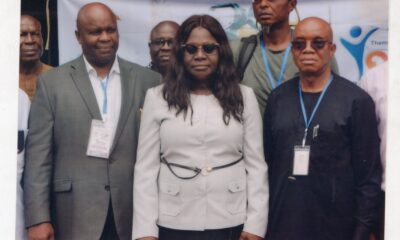Politics
Electoral Reforms Top Constitution Review Hearing
The need for electoral reforms in the country took the front burner at the just-concluded South-South Zonal Public Hearing on the proposed alterations to the provisions of the Constitution held in Port Harcourt. Most of the stakeholders who presented papers at the two day exercise picked holes in the country’s electoral process, saying the way the constitution presently operates would not guarantee a free and fair elections. Representative of Coalition of Democrats for Electoral Reform, Prince Ebitimi Agbani noted that the only way to move the country forward was to reorganise the process of elections. In his view, the Justice Uwais Electoral Reform Report should be thoroughly studied such that the salient parts should be tapped for the betterment of the country. Prince Agbani submitted that the federalism demands the need for the country to have State Electoral Commissions to exist side-by-side with the federal body. In the light of this, he argued that instead of scrapping them as canvassed in some quarters, the authorities should establish a Judicial Commission that would screen and appoint the chairman of INEC instead of the federal government. Also, he recommend that political parties be made members of the Independent Electoral Commission (INEC) so that their interests and view would be considered before and major electoral policy. In order to punish offenders during elections, Prince Agbani said the government should institutionalise the Electoral Offences Commission, “they would properly address the issue of violence because we have discovered that most times the Attorney-General do not make any strong case against such people”. In the same vein, Mr. Patrick Chiekwe of the Save Earth Nigeria called for the need to expunge Chapter Six, Section D of the 1999 Constitution, to give room for more women participation in politics. He observed that the political process as it exists now denies women enough room to participate, stressing that women serve as a healthy check in the system. Mr. Chiekwe noted that this can be achieved through the implementation of Affirmative Action and the establishment of a special fund for women to draw four.
Politics
INEC Denies Registering New Political Parties

The Independent National Electoral Commission (INEC) says it has not registered any new political parties.
The commission gave the clarification in a statement on its X (formerly Twitter) handle last Wednesday.
It described the purported report circulated by some online social media platforms on the registration of two new political parties by INEC as fake.
“The attention of INEC has been drawn to a fake report making the rounds about the registration of two new political parties, namely “Independent Democrats (ID)” and “Peoples Democratic Movement (PDM)”.
“For the avoidance of doubt, the commission has not yet registered any new party. The current number of registered political parties in Nigeria is 19 and nothing has been added,” it stated.
The commission recalled that both ID and PDM were registered as political parties in August 2013.
INEC further recalled that the two were deregistered in February 2020 in accordance with Section 225A of the 1999 Constitution of the Federal Republic of Nigeria.
The commission, therefore, urged the public to disregard the said report.
Politics
You Weren’t Elected To Bury People, Tinubu Tells Alia

President Bola Tinubu has asked Governor Hyacinth Alia to work more for peace and development of Benue State, saying he was elected to govern, not to bury people.
The President said this while addressing stakeholders at the Government House, Markudi, last Wednesday.
He also called on the governor to set up a peace committee to address some of the issues in the state.
The meeting included the Secretary to the Government of the Federation (SGF), George Akume, traditional rulers, and former governors of the state.
The governors of Kwara, Imo, Kogi, Plateau, Ondo, and Nasarawa states also attended the meeting.
“Let us meet again in Abuja. Let’s fashion out a framework for lasting peace. I am ready to invest in that peace. I assure you, we will find peace. We will convert this tragedy into prosperity,” he said.
President Tinubu urged Governor Alia to allocate land for ranching and directed the Minister of Agriculture and Food Security to follow up.
“I wanted to come here to commission projects, to reassure you of hope and prosperity, not to see gloomy faces. But peace is vital to development.
“The value of human life is greater than that of a cow. We were elected to govern, not to bury people”, he stressed.
He charged Governor Alia on working with the Federal Government to restore peace.
“Governor Alia, you were elected under the progressive banner to ensure peace, stability, and progress. You are not elected to bury people or comfort widows and orphans. We will work with you to achieve that peace. You must also work with us”, he said.
In his remarks, Governor Alia appealed to the Federal Government to establish a Special Intervention Fund for communities affected by repeated violent attacks across the state.
“Your Excellency, while we continue to mourn our losses and rebuild from the ashes of pain, we humbly urge the Federal Government to consider establishing a special intervention fund for communities affected by these incessant attacks in Benue State,” he said.
Governor Alia said the fund would support the rehabilitation of displaced persons, reconstruction of destroyed homes and infrastructure, and the restoration of livelihoods, especially for farmers.
He reiterated his support for establishing state police as a lasting solution to insecurity.
The governor pledged his administration’s full commitment to building a safe, stable, prosperous Benue State.
Also speaking at the meeting, the Chairman of the Benue State Traditional Rulers Council, Tor Tiv, Orchivirigh, Prof. James Ayatse, praised President Tinubu for being the first sitting President to personally visit victims in the hospital in the wake of such a tragedy.
He thanked the President for appointing notable Benue indigenes into key positions, including the Secretary to the Government of the Federation and the Minister of Water Resources and Sanitation, Professor Joseph Utsev, while expressing hope that more appointments would follow.
Politics
Gowon Explains Why Aburi Accord Failed
Former Head of State, Gen. Yakubu Gowon (ret’d), says the Aburi accord collapsed because Chukwuemeka Ojukwu wanted regional governors to control military zones.
Gen. Gowon was Nigeria’s military ruler from 1966 until 1975 when he was deposed in a bloodless coup while Ojukwu was military governor of the then Eastern Region in that span.
In a live television interview recently, Gen. Gowon narrated what transpired after the agreement was reached in Aburi, a town in Ghana.
The meeting that led to the accord took place from January 4 to 5, 1967, with delegates from both sides of the divide making inputs.
The goal was to resolve the political impasse threatening the country’s unity.
The point of the agreement was that each region should be responsible for its own affairs.
During the meeting, delegates arrived at certain resolutions on control and structure of the military. However, the exact agreement reached was the subject of controversy.
The failure of the Aburi accord culminated in Nigeria’s civil war, which lasted from July 6, 1967, to January 15, 1970.
Speaking on what transpired after the agreement, Gen. Gowon said the resolutions should have been discussed further and finalised.
The ex-military leader said he took ill after arriving in Nigeria from Aburi and that Ojukwu went on to make unauthorised statements about the accord.
Gen. Gowon said he did not know where Ojukwu got his version of the agreement from.
“We just went there (Aburi), as far as we were concerned, to meet as officers and then agree to get back home and resolve the problem at home. That was my understanding. But that was not his (Ojukwu) understanding,” he said.
Gen. Gowon said Ojukwu declined the invitation, citing safety concerns.
“I don’t know what accord he (Ojukwu) was reading because he came to the meeting with prepared papers of things he wanted. And, of course, we discussed them one by one, greed on some and disagreed on some.
“For example, to give one of the major issues, we said that the military would be zoned, but the control… He wanted those zones to be commanded by the governor.
“When you have a military zone in the north, it would be commanded by the governor of the military in the north, the military zone in the east would be commanded by him. Of course, we did not agree with that one”, Gen. Gowon added.
Ojukwu died on November 26, 2011 at the age of 78.
-
Business2 days ago
Create Diving Schools, Expert Urges FG
-

 News2 days ago
News2 days agoFoundation Tasks Parents, Families On Moral Rectitude
-
News2 days ago
COAS Hails 542 New Military Retirees Over Selfless Service
-

 Politics2 days ago
Politics2 days agoYou Weren’t Elected To Bury People, Tinubu Tells Alia
-
Sports2 days ago
NAFA President meets NSC Over tournaments in Egypt
-
Business2 days ago
Okpebholo Charges Committee To End Herders, Farmers Clash In Edo … Inaugurates Boundary Committee
-
Niger Delta2 days ago
Rep Member Attracts N1.7bn Projects To Ibiono Ibom/Itu Constituency
-

 News2 days ago
News2 days agoDeputy Leader, 32 Other Iceland Members Denounce Cultism In Khana

